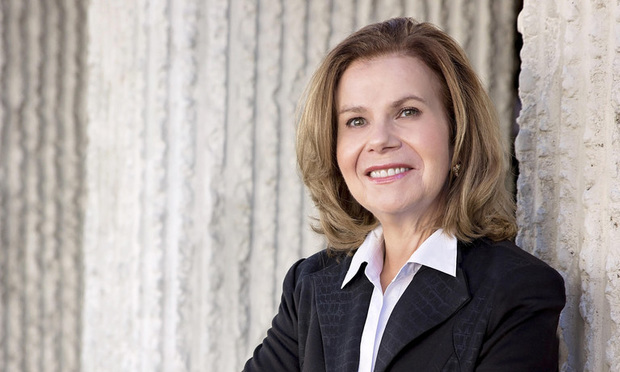AAML Survey Uncovers Difficulties for Family Law Attorneys During COVID-19 Pandemic: A Q&A With Susan Myres
The American Academy of Matrimonial Lawyers surveyed its members from across the United States and found that even though demand was there, circumstances caused by the pandemic make it difficult for clients to pursue divorce right now.
May 07, 2020 at 07:58 PM
6 minute read
 Susan Myres, president of American Academy of Matrimonial Lawyers.
Susan Myres, president of American Academy of Matrimonial Lawyers.
Family lawyers are coping with declining business, as are many other professionals, during the COVID-19 pandemic, according to a survey conducted by the American Academy of Matrimonial Lawyers (AAML).
The organization surveyed its members from across the United States and found that even though demand was there, circumstances caused by the pandemic—court closures, income reduction, temporary reduction in the value of property and stock, etc.—make it difficult for clients to pursue divorce right now.
Recently, Texas Lawyer had the chance to speak with Houston attorney Susan Myres, president of the AAML, about her organization's survey.
Why did the AAML decide to do the survey?
Susan Myres: We thought if we had a better idea how our Academy fellows (members) were coping during the pandemic, we might be better able to provide the information and support that would be of most use to them. That information would, in turn, also be useful to our courts and our clients.
What was the most surprising thing you discovered?
We were really surprised that family lawyers' business had decreased in all parts of the country, not just in areas that were particularly hard hit by the coronavirus. We think our survey is a fairly representative sampling, though not rigorously scientific. Almost 40% of our members participated. Also, our members, who undergo a challenging process to gain entrance to the Academy, tend to be among the top practitioners in their locales. If they have seen their business decline, it is likely that others are struggling as well.
What should family lawyers be doing to improve, or just get through, these tough times?
In this respect we Texas lawyers are very fortunate. Our courts are highly advanced in their ability to hold "virtual" hearings covering nonessential matters, and are able to hold these hearings even over the objections of the parties involved. However, if parties to the matter in question cannot be served, that is a legitimate obstacle to a digital hearing.
Glitches do occur in virtual hearings. I heard of one such hearing recently in which one of the parties, a woman, mumbled something about having laundry to attend to, and then left the screen and never came back. Of course, there were no bailiffs available to return her to court. Also lawyers and clients sometimes get so relaxed that they forget the need to dress for court pretty much the same as they would if they were going to be holding forth in an actual courtroom. If you take the time to watch any of the court proceedings currently available online, you will be surprised by the postures and levels of attention exhibited by some participants who appear to be unaware of the image they are projecting onscreen.
Here is where the Academy is helping: Academy members who do have experience with virtual hearings are helping individual lawyers cope with virtual hearings, and even assisting lawyers and courts in other states in establishing their own video courtroom sessions.
Some attorneys who have no experience in the virtual world are concerned that they won't be able to present their cases effectively in a digital setting. It is—no question—a learning process. Attorneys need to strategize far in advance and make sure that not only they but also their clients present well on camera. Fidgeting that gets a pass in an in-person courtroom setting, for example, can be very distracting on camera.
During this tough period, it's also important for lawyers to offer as much helpful advice to clients and potential clients as they can, through websites and blogs and, in some cases, virtual mediation. Parents sharing custody of children are running into serious visitation and child support problems and may need more wise counsel than usual.
We had a situation arise at our firm in which one parent lived in Texas and the other in Louisiana, and people traveling from Louisiana into Texas were being ordered by our governor to quarantine themselves for two weeks. Our out-of-court suggestion was that the parents resolve that issue by meeting at the state line to exchange the child.
What about potential clients, what kinds of questions should they be asking if they are considering filing for divorce at this time?
The first question is, generally, "Should I do this now? What are the advantages and disadvantages of filing now in my particular situation?" One consideration is that we expect that the courts will be confronted with a tsunami of claims, once they fully reopen. It might be a good idea to go ahead and file now and get a docket number rather than end up at the end of a very long line of complex cases. The details involving division of property will probably require months of work anyway. In no case will a divorce take place the day after filing!
Everyone should be cautioned not to make this life-altering decision in the heat of the moment without calm and deliberate reflection. Consulting with an experienced lawyer does not mean you are going to file for divorce. It means your decision to file or not to file will be better informed.
What about cases in which there is a danger of domestic violence or abuse, or the atmosphere between spouses has become especially unpleasant?
In these cases, we advise that clients first listen to their instincts and determine if the danger is imminent. If so, they should call the police or sheriff without hesitation. Shelters in the Houston area are creating medically and physically safe havens for victims of domestic abuse. If the violence is not imminent, but there is still a serious potential threat, clients should consult with their lawyers and get an emergency hearing scheduled. Usually this does not require a great deal of time.
One thing we know for sure: when our family courts do fully reopen, they will be extremely busy, as pent-up demand leads to an upswing in divorce filings, modifications of orders and enforcement actions. There will also be parents who share custody, litigating actions taken during the pandemic. Family lawyers' services will be needed even more than before the pandemic occurred. In these cases, it's a very good idea to take early advantage of alternative dispute processes to resolve the controversy. Most courts will give deference to cases that have already undergone attempts at mediation before those that have not.
Susan Myres is a board-certified family law attorney at Myres & Associates. She has been practicing in Houston for over 35 years and has served in leadership positions locally, statewide and nationally. She is also the current president of the American Academy of Matrimonial Lawyers (AAML).
This content has been archived. It is available through our partners, LexisNexis® and Bloomberg Law.
To view this content, please continue to their sites.
Not a Lexis Subscriber?
Subscribe Now
Not a Bloomberg Law Subscriber?
Subscribe Now
NOT FOR REPRINT
© 2025 ALM Global, LLC, All Rights Reserved. Request academic re-use from www.copyright.com. All other uses, submit a request to [email protected]. For more information visit Asset & Logo Licensing.
You Might Like
View All
Energy Lawyers Field Client Questions as Trump Issues Executive Orders on Industry Funding, Oversight
6 minute read
Holland & Knight Hires Former Davis Wright Tremaine Managing Partner in Seattle
3 minute read
Kirkland Is Entering a New Market. Will Its Rates Get a Warm Welcome?
5 minute read
Trending Stories
- 1We the People?
- 2New York-Based Skadden Team Joins White & Case Group in Mexico City for Citigroup Demerger
- 3No Two Wildfires Alike: Lawyers Take Different Legal Strategies in California
- 4Poop-Themed Dog Toy OK as Parody, but Still Tarnished Jack Daniel’s Brand, Court Says
- 5Meet the New President of NY's Association of Trial Court Jurists
Who Got The Work
J. Brugh Lower of Gibbons has entered an appearance for industrial equipment supplier Devco Corporation in a pending trademark infringement lawsuit. The suit, accusing the defendant of selling knock-off Graco products, was filed Dec. 18 in New Jersey District Court by Rivkin Radler on behalf of Graco Inc. and Graco Minnesota. The case, assigned to U.S. District Judge Zahid N. Quraishi, is 3:24-cv-11294, Graco Inc. et al v. Devco Corporation.
Who Got The Work
Rebecca Maller-Stein and Kent A. Yalowitz of Arnold & Porter Kaye Scholer have entered their appearances for Hanaco Venture Capital and its executives, Lior Prosor and David Frankel, in a pending securities lawsuit. The action, filed on Dec. 24 in New York Southern District Court by Zell, Aron & Co. on behalf of Goldeneye Advisors, accuses the defendants of negligently and fraudulently managing the plaintiff's $1 million investment. The case, assigned to U.S. District Judge Vernon S. Broderick, is 1:24-cv-09918, Goldeneye Advisors, LLC v. Hanaco Venture Capital, Ltd. et al.
Who Got The Work
Attorneys from A&O Shearman has stepped in as defense counsel for Toronto-Dominion Bank and other defendants in a pending securities class action. The suit, filed Dec. 11 in New York Southern District Court by Bleichmar Fonti & Auld, accuses the defendants of concealing the bank's 'pervasive' deficiencies in regards to its compliance with the Bank Secrecy Act and the quality of its anti-money laundering controls. The case, assigned to U.S. District Judge Arun Subramanian, is 1:24-cv-09445, Gonzalez v. The Toronto-Dominion Bank et al.
Who Got The Work
Crown Castle International, a Pennsylvania company providing shared communications infrastructure, has turned to Luke D. Wolf of Gordon Rees Scully Mansukhani to fend off a pending breach-of-contract lawsuit. The court action, filed Nov. 25 in Michigan Eastern District Court by Hooper Hathaway PC on behalf of The Town Residences LLC, accuses Crown Castle of failing to transfer approximately $30,000 in utility payments from T-Mobile in breach of a roof-top lease and assignment agreement. The case, assigned to U.S. District Judge Susan K. Declercq, is 2:24-cv-13131, The Town Residences LLC v. T-Mobile US, Inc. et al.
Who Got The Work
Wilfred P. Coronato and Daniel M. Schwartz of McCarter & English have stepped in as defense counsel to Electrolux Home Products Inc. in a pending product liability lawsuit. The court action, filed Nov. 26 in New York Eastern District Court by Poulos Lopiccolo PC and Nagel Rice LLP on behalf of David Stern, alleges that the defendant's refrigerators’ drawers and shelving repeatedly break and fall apart within months after purchase. The case, assigned to U.S. District Judge Joan M. Azrack, is 2:24-cv-08204, Stern v. Electrolux Home Products, Inc.
Featured Firms
Law Offices of Gary Martin Hays & Associates, P.C.
(470) 294-1674
Law Offices of Mark E. Salomone
(857) 444-6468
Smith & Hassler
(713) 739-1250






